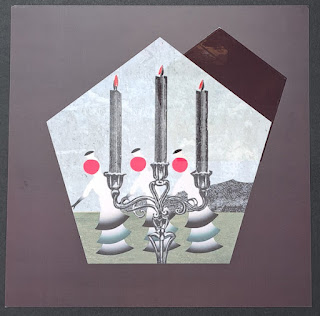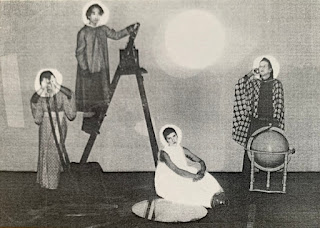A big thing in the 1970s - probably the immediately preceding decades too - was symbolism.
No one talks about it nowadays, do they?
No one says "such-and-such is symbolic of...". Or "how symbolic!" Or "the symbolism is obvious".
Maybe it was related to that uptake of Freudianism into the popular culture that happened post-WW2 - Marnie and that kind of thing. All of Hitchcock really. Splendour in the Grass.
Perhaps it was related to trends in literary criticism, or the way novels, plays, poems were taught in the classroom. I seem to remember reading someone or other (Nabokov? Kael?) railing against this middlebrow way of approaching art.
But I'm thinking psychoanalysis - and the popularity of dream diaries and dream analysis - that's where it mainly comes from. (Surrealism also would have been a conduit).
Advertising was full of it: on Madison Avenue, and whatever the British equivalent was, the copywriters were probably among the most avid readers of Freud and Jung and Adler (or bastardized versions thereof). At some point - I'm thinking post-WW2 but possibly slightly earlier - the admen and the marketing people realised they are not selling usefulness, value for money, or even attractive design. Their real business is peddling dreams, fantasies, desires, status (status symbols, another concept no one ever uses these days). Wish fulfillment via displacement, condensation, metonymy. Symbolism!
But yes if you are a teenager, the idea of symbolism - especially phallic symbolism - is very grabbing . You start to see it everywhere.
You feel like you've cottoned on to something. The code.
I remember seeing this play Double Dare by Dennis Potter - I would have been 13 when it aired in 1976 - and being shocked-thrilled by the bit where the serious playwright character is talking to a serious-aspiring actress who wants a part in whatever he's doing next. He brings up the fact that she appeared in a TV ad for a Fraggie Bar (a crumbly chocolate treat clearly modelled on Cadbury's Flake). The playwright can't stop himself, he simply has to ask her - did the commercial director, did he actually ask her to pretend it was a penis?
The scene is about 20 minutes in - and in the middle of it there's a pastiche of the Flake commercials of that time, which did edge into the Emmanuelle softcore erotica zone.
Today there's no need to bother with symbolism, is there? Or indeed innuendo and the double entendre. The very notion of suggestiveness is gone. You don't suggest, you show. You don't hint, you say.
Hence programs like Naked Attraction. Or Sex Education. Dick pix. Sexting. The pornucopia of the internet. The word "cunt" is virtually common parlance in TV drama and comedy. "Fuck" is nothing at all.
Everything's graphic, it's all out there in plain view.
Consequently, where would the need be to harness the hidden energies of Libido to sell products? In a post-repression society, surely these tactics would have little traction?
I can't say I've done an exhaustive scan of current advertising trends - like most people I should imagine, I skip through them as much as I can, fast-forward, or, if that's not possible, just look at my phone - or take a leak - until the ad break, the ads interruption, is over. I can't think of any current ads (apart from the ongoing Progressive campaign with Flo and her younger, gratingly-voiced new addition / rival) that are anything like all those commercials of our youth that were (forgive me) "iconic" - ads that we would reperform in the playground, just like we did with our favorite sketches from comedy shows. Ads where you'd sing the ear-worm jingle. Ads that would get spoofed on TV comedy shows (like with this Jaspar Carrott parody of the Flake commercials).
Even so, just catching TV ads out of the corner of my eye, I get the impression that sex is not something that advertising is trying to use to shift products nowadays.
Young people - so it's reported, based on surveys - are in fact having less sex than previous generations did. They are forming serious relationships much later in life. There's reduced interest in that whole area. Attraction has less attraction.
You once used to be able to explain pop music and rock'n'roll etc almost entirely in those terms. This was the gas in the engine driving it - the demand, almost volcanic, for "satisfaction".
But it seems to me that figures like Madonna, or Prince - whose whole shtick was based around unrepression and liberation, the bursting free of unbridled sensual pleasure - they are going to seem more and more inexplicable as time goes by. (They were already a bit dated in the 1980s, to be honest, given that Dr Ruth was on TV, while on the lower shelves in the newsagents you had your Cosmos and similar magazines with the monthly article on how to improve your sex life, detailed advice and instructions, etc).
I can already anticipate finding this aspect of popular music hard to explain to my students. They won't be able to understand the impact in their time of Presley with his pelvis, the Rolling Stones's blend of effeminacy and virility, Jim Morrison with his "erotic politics", even Bowie.
Is there a current major pop star whose thing is based on sex?
It's not what Taylor Swift is selling - not at all.
Late breaking addition suggested by Lee in Comments - a Flake commercial by Jonathan Glazer that was rejected by Cadbury





















































